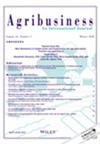Role of environmental, social and governance disclosure in business profitability and cost of debt: An analysis of small Southern Italian agri‐food businesses
IF 2.1
3区 经济学
Q2 AGRICULTURAL ECONOMICS & POLICY
引用次数: 0
Abstract
This article investigates the environmental, social, and governance (ESG) commitment of small agri‐food businesses disclosed by 279 Italians using Thomson Reuters Eikon ESG indicators and its relationship with their financial dimensions, that is, the corporate profitability indexes (ROE and EBITDA) and cost of debt, used as a proxy of the ability to access credit. Findings showed the absence of social reporting and the disclosure of business governance, including sustainability strategy, and the poor reporting of the environmental and social pillars, except for product innovation, product quality, and responsible marketing themes. The capability of ESG disclosure to predict corporate profitability and access to credit is limited. Moreover, investments in product responsibility are negatively related to the cost of debt, while commitment toward the internal and external companies' community appears to predict their ability to access credit positively. In light of the new institutional pressures requiring small agri‐food businesses to change and combine intrinsic and extrinsic motivation for CSR, the study extends the literature on the sustainability of small agri‐food businesses, which is mostly limited, and provides significant practical and political contributions to foster the paradigm shift toward sustainability [EconLit Citations: M21, Q01, Q13].环境、社会和治理信息披露在企业盈利能力和债务成本中的作用:对意大利南部小型农业食品企业的分析
本文利用汤森路透 Eikon ESG 指标,调查了 279 家意大利小型农业食品企业披露的环境、社会和治理(ESG)承诺,以及这些承诺与企业财务层面的关系,即企业盈利能力指数(投资回报率和息税折旧摊销前利润)和债务成本(作为获得信贷能力的替代指标)。研究结果表明,除了产品创新、产品质量和负责任的营销主题外,企业缺乏社会报告和包括可持续发展战略在内的企业治理披露,而且环境和社会支柱的报告较少。环境、社会和治理信息披露在预测企业盈利能力和获得信贷方面的能力有限。此外,在产品责任方面的投资与债务成本呈负相关,而对公司内部和外部社区的承诺似乎可以预测其获得信贷的能力。鉴于新的制度压力要求小型农业食品企业进行变革,并将企业社会责任的内在和外在动机结合起来,本研究扩展了关于小型农业食品企业可持续性的文献(这些文献大多有限),并为促进向可持续性的范式转变做出了重要的实践和政治贡献[经济学引文:M21, Q01, Q13]。
本文章由计算机程序翻译,如有差异,请以英文原文为准。
求助全文
约1分钟内获得全文
求助全文
来源期刊

Agribusiness
农林科学-食品科技
CiteScore
5.50
自引率
6.20%
发文量
58
审稿时长
6 months
期刊介绍:
Agribusiness: An International Journal publishes research that improves our understanding of how food systems work, how they are evolving, and how public and/or private actions affect the performance of the global agro-industrial complex. The journal focuses on the application of economic analysis to the organization and performance of firms and markets in industrial food systems. Subject matter areas include supply and demand analysis, industrial organization analysis, price and trade analysis, marketing, finance, and public policy analysis. International, cross-country comparative, and within-country studies are welcome. To facilitate research the journal’s Forum section, on an intermittent basis, offers commentary and reports on business policy issues.
 求助内容:
求助内容: 应助结果提醒方式:
应助结果提醒方式:


